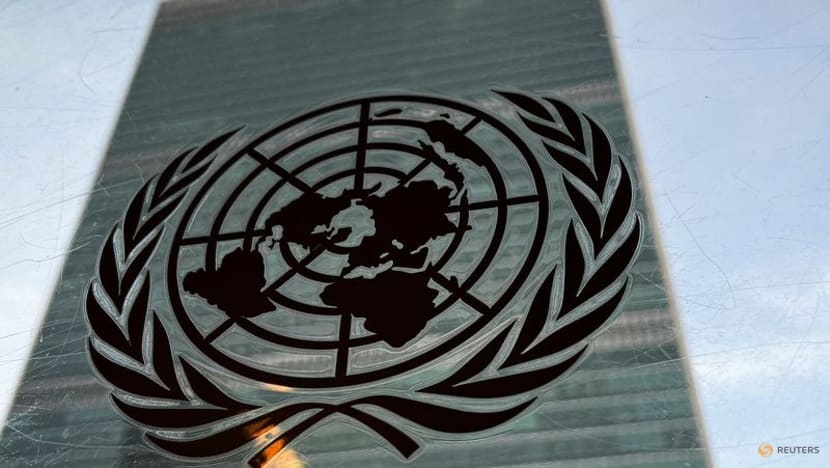Commentary: Why I haven’t given up on idealism about the United Nations yet
It’s tempting to succumb to cynicism about the United Nations, but there is optimism to be found despite the ritualistic summit speak, says the Financial Times’ Gillian Tett.

NEW YORK: This week, I was moderating a session at the United Nations General Assembly in New York, when the audience suddenly erupted. They were cheering Mia Mottley, the prime minister of Barbados, who’d just delivered an impassioned speech, asking the rich countries of the world to channel more money to the poor. “We cannot have sustainable development goals without the framework to finance them!” she argued.
Joining in the clamour was Ajay Banga, the former head of Mastercard who recently became president of the World Bank; although Mottley has previously lambasted the bank, she is now keen to support Banga, in the hope he will deliver reform.
Indeed, before participating in the session, the pair hugged so warmly that Banga’s turban ended up sitting on the shoulder of Mottley’s suit. “I agree with what she says!” he said in a display of bonhomie.
Is this just so much diplomatic posturing or can the UN actually do any good? It’s a question I’ve pondered ever since I first entered the organisation’s soaring tower in New York a dozen years ago.
CYNICISM AND DESPAIR
As an idealistic teenager, I had been infatuated with its lofty mission of promoting international collaboration and peace. Witnessing it at closer quarters as an adult, my reverence turned to cynicism, if not despair.
Partly, this was down to past corruption scandals and the UN’s reputation for infuriating bureaucracy.
But it was also because, in an era of rising geopolitical fragmentation, it seemed increasingly challenging for the UN to achieve the goals it was set up for in 1945. The fact that Russia has a veto on the Security Council has become a particularly galling symbol of its impotence.
As the latest General Assembly got under way, the usual maddening foibles were on display. Gaining entry to the building required navigating no fewer than eight different checkpoints.
The procedures inside the tower were equally bureaucratic. While moderating a session on trade, I was informed that the interpreters had to stop working at a pre-assigned hour even though an Angolan official was still speaking earnestly in Portuguese.
Most “debates” are actually a series of formal speeches laden with vague platitudes, with the notable exception of Ukraine President Volodymyr Zelenskyy’s impassioned address to world leaders.
REALITY AND RHETORIC
Even more irritating than the rigid protocol is the gap between reality and rhetoric.
As I walked into the auditorium, I was surrounded by posters with chirpy slogans such as “It’s possible to end poverty (and) ensure that no one goes to bed hungry”. But then the secretary-general Antonio Guterres told the Assembly Hall that the UN is “woefully off track” in its progress towards its sustainable development goals.
I spotted a piece of art, donated by the Afghan government in 2021, depicting children frolicking next to a girl studying a book. The grim reality is that the UN and West have been unable to stop the Taliban from crushing women’s rights in Afghanistan.
As one senior diplomat observed, the world is currently plagued by 28 official wars using a narrow definition or, if you use a broader term, 56 military conflicts. This is more than at any point in recent history and particularly chastening when you consider that the UN was founded to avoid a repeat of World War II.
NO POWER OR MONEY, BUT A VOICE
Yet, just when I feel tempted to succumb to cynicism entirely, something about the place and its organisation manages to reawaken my former teenage optimism. It happened when I walked along the green carpet leading into the General Assembly hall, and saw the multicoloured whirl of nearly 200 flags festooning the entrance.
After listening to a string of dull speeches, I heard a 12-year-old activist called Faatiha Aayat deliver a passionate defence of Muhammad Yunus, the founder of the microcredit movement who is being persecuted in Bangladesh, and my spirits soared again. So too when Al Gore, former US vice president, dropped into a party and delivered an electrifying, off-the-cuff speech about renewable energy.
On stage, witnessing the calls from Mottley and Banga for World Bank reform, I felt another tiny flash of optimism.
No, nothing tangible has happened yet to actually unlock more money for poor nations. In that sense, the exchange was just the kind of ritualistic summit speak that the climate activist Greta Thunberg has described as “blah, blah, blah”.
Yet rituals like this still matter, since even if they do not reflect the world as it is, they project a vision of how we would like to be. Or, as Guterres told CNN with admirable candour, the point about the UN today is that “there’s no power and no money. What we have is a voice.”
Yes, the UN badly needs reform, but I still believe the world would be worse off today if that voice did not exist.
















